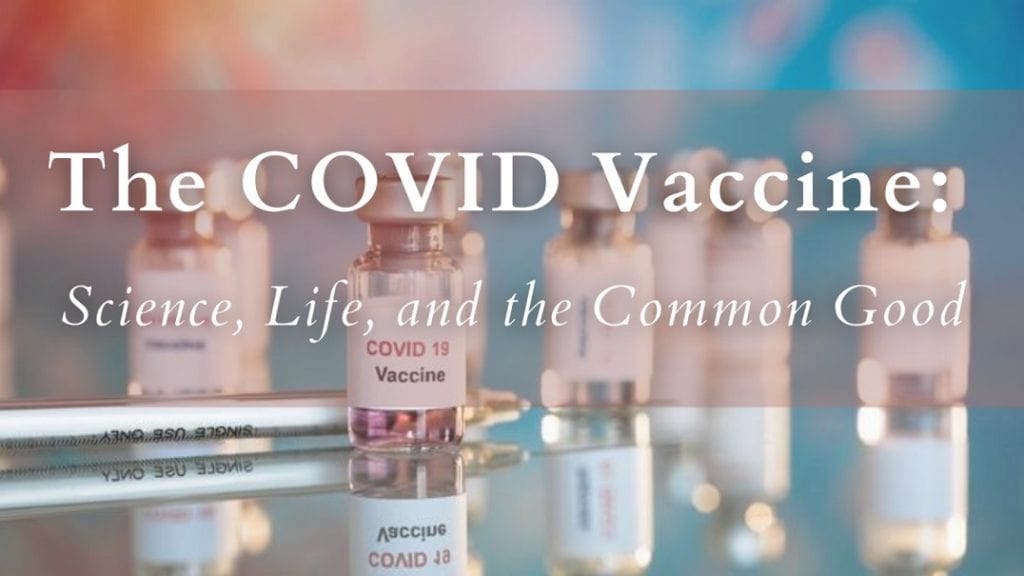What are the ethical implications of getting a COVID-19 vaccine which, however indirectly, benefitted from an abortion? This is the question the Catholic University of America’s Institute on Human Ecology (IHE) set out to answer in their webinar The Covid Vaccine: Science, Life and the Common Good.
The IHE describes itself as “the nation’s leading academic institute committed to increasing scientific understanding of the economic, cultural, and social conditions vital for human flourishing.” The webinar’s participants included Paul Scherz, who holds doctorates in both genetics and moral theology, as well as philosophy professors V. Bradley Lewis and Melissa Moschella of the Catholic University.
The essence of the problem is this: all of the COVID vaccines that have been approved so far or are likely to be approved soon are in some way connected to an abortion which took place in the 1970s. After the abortion took place the embryonic kidney of the fetus was induced to replicate its cells indefinitely, thus enabling a wide variety of advances in biotechnology and gene therapy in the last half century. The cells grown from this original aborted fetus are collectively referred to as HEK-293.
Despite the real progress in medicine that HEK-293 has led to, the ethical questions remain. How are we as Christians supposed to feel about a COVID vaccine, or any medical treatment for that matter, which would not have been possible without an abortion taking place?
The panelists agreed that, although it would have been better if no abortions had occurred in connection with the vaccines, that they can still be taken in good conscience. Firstly, they drew some distinctions between the different vaccines and how HEK-293 was used in connection with each.
Of the currently approved vaccines, the Pfizer and Moderna are based on a new technology that uses mRNA and therefore didn’t require HEK-293 in order to be developed. However, HEK-293 was used for confirmatory lab trials to see if the vaccine was actually effective. In contrast, the Astrazeneca and Johnson & Johnson vaccines did need HEK-293 to be developed and also tested.
Does this difference morally matter? According to Scherz it does. “A long tradition of Catholic casualty has said we should pay attention to how distant we are causally from the action. The fact that the Astrazeneca and J&J vaccines… are involved in the actual production of the [vaccine] and that for the Pfizer one they were just confirmatory tests that occur would suggest that the Moderna and Pfizer ones are further distanced from the evil.”
Moschella disagreed that the difference was significant, instead opting to analyze the vaccines through a lens of whether they further perpetuate evil, saying that they do not. In contrast to the controversies over embryonic stem cells derived from in vitro fertilization (IVF) from the early 2000’s, HEK-293 is very different. With HEK-293 it isn’t necessary to perpetually grow more fetuses for the purpose of growing stem cells to be used because the cells reproduce indefinitely. This means that using HEK-293 doesn’t cause more demand for abortions, and in fact using it over embryonic stem cells would presumably reduce demand for them.
The taking of a vaccine that needed HEK-293 to be created is not creating a demand (and therefore a market) for more aborted fetus stem cells. More evil is not brought into the world by benefiting from an evil action that took place long ago.
Moschella compared using HEK-293 to benefiting from slave labor. With slave labor, when you buy clothes or chocolate or whatever made with slave labor not only are you benefiting from that slave labor but you are also creating more demand for it. In contrast, although many buildings in the American South were built with money from a slave-based economy, living in those buildings today doesn’t cause demand for more slavery even if it benefits from it in the past.
She also compared the vaccines to Nazi medical research carried out in the 1930s and 40s, where despite the data being acquired in a horribly evil context it has still been used for good. If we were to abandon all of the research that we thought had been gathered immorally we would have to then re-derive some other way, letting all the people who would benefit from it suffer in the meantime.
So, as long as you aren’t directly cooperating with a present evil or enabling it then you can have a clear conscience. There are of course other positive reasons to take the vaccine, like saving yourself and the community from the ravages of COVID-19. Taken together, the panelists agreed we should all be on-board with vaccination.






Comment by David on January 27, 2021 at 11:06 am
I frankly cannot understand why this issue arose in the first place. It is extremely unlikely anyone would have an abortion to provide medical science with research material. The “products of conception” used would otherwise have been incinerated. I have worked with placentas from normal births. These were a valuable source of enzymes extracted for study. Certain body parts from the dead are routinely used to provide the living with benefits such as sight. While the article redeems itself in the last paragraph, it is still not in the public interest. It provides possibly another excuse for people not to be vaccinated. We will have enough resistance from those who think Cov-19 is a “hoax” and refuse precautions and vaccination for political reasons.
Comment by Jeff on January 27, 2021 at 11:45 am
No worries, David.
Someday, in your spiritual persona “Almighty David, Leftist Apologist”, you will have the opportunity to face the Creator of the Universe, and set Him straight as to how He and His children are to use (and to regard) those so-called “products of conception”.
Meanwhile, until that day wherein I must give an answer to the King, I’ll trust in His Spirit testifying to my spirit as to the convictions of my conscience. No vaccine for me, thanks.